I love the end of Stefan: to be the first man on the moon was a great final achievement! 
The Hohenzollerns megacampaign part 2: For God and the family (Bavaria DW 5.2)
- Thread starter Avindian
- Start date
-
We have updated our Community Code of Conduct. Please read through the new rules for the forum that are an integral part of Paradox Interactive’s User Agreement.
You are using an out of date browser. It may not display this or other websites correctly.
You should upgrade or use an alternative browser.
You should upgrade or use an alternative browser.
Oops, I thought that the background of the Lombard culture shot said that Etruria went bankrupt but they collapsed instead.
Gotcha.
Long live Clement August I von Hohenzollern!
Here's hoping!
I love the end of Stefan: to be the first man on the moon was a great final achievement!
Well, parts of him are.
I wonder if there will be a power struggle for the Regent.
I haven't decided yet; maybe there will be now.
Since none of you are observant enough for the contest -- I originally had Ludwig as Wilhelm's son. Which is hard when Wilhelm was 7 when Ludwig was born.
I haven't known you can have an infant elected to be the Kaiser...
Maybe it's 5.2 that allows regency councils to be Kaisers, but it's definitely not me cheating.
Maybe it's 5.2 that allows regency councils to be Kaisers, but it's definitely not me cheating.
Oh, I am not accusing you in any way, it's just...you learn something new every day
Last edited:
you can have regencies as Kaiser even in 5.1, I have it in my game right now as Brandenburg. My monarch, August II, is an infant, and was still elected Kaiser.
you can have regencies as Kaiser even in 5.1, I have it in my game right now as Brandenburg. My monarch, August II, is an infant, and was still elected Kaiser.
Well, I do not play EU3 a lot
Oh, I am not accusing you in any way, it's just...you learn something new every day.
you can have regencies as Kaiser even in 5.1, I have it in my game right now as Brandenburg. My monarch, August II, is an infant, and was still elected Kaiser.
Well, I do not play EU3 a lot.
Maybe you should.
For those of you eagerly awaiting more Hohenzollern adventures, I should be able to update Monday or Tuesday.
Chapter 14: The shifting tides of politics
Note: Before I begin the update, I apologize for taking so long to get back to this AAR. It's been a very busy week! I can't say this won't happen again, but I will do my best to make sure it doesn't.
22 August 1541, Breisgau
Joseph Clemens Livizzani, grandson of the former steward, had no idea what to expect when he arrived to his new diocese.

For the first time in over a hundred years, Bayern was ruled by a regency council, and it was a very unstable regency council. In fact, the very reason that Joseph was on the Reichsrat was the unexpected dismissal and later death of Marshal Halfbrädt. What had begun as a court martial process for corruption ended up the execution of the highest ranking military officer in the Bavarian army. It was Halfbrädt who, furious about the fact he was increasingly set aside in favor of better battlefield commanders, began stealing money from the military budget. His eventual plan was to defect to Wallachia with Csilla Dracova, use his money to raise a mercenary army, and then lead a coup d'etat against the Hohenzollerns he'd come to loathe. To affect their desires, Csilla and Adalbert found and hired Maxicatl to kill Wilhelm von Hohenzollern. It was the Aztec assassin who came up with the plan to target Ludwig instead and, when Philipp appeared, Philipp as well. Maxicatl's hatred of the Hohenzollerns encouraged him to do this for free. When Halfbrädt confessed his crimes, Maxicatl was quickly caught and executed by the same firing squad that killed the ex-Marshal. Markus Asch was promoted to Marshal and the rank of Ritterkommandant left absent, until another war might occur. Livizzani was brought on to the Imperial regency council to provide religious balance and to lead the efforts of Bayern to restore Catholicism to all of her provinces.
The very first regent for Clemens I was his mother, Ulrike. She was effective, rapidly convening the Electors to get her son elected and also spreading the Bavarian Bureaucratic Reforms throughout the Empire.

She also negotiated the betrothal of Clemens to an Aquelian princess named Dorothea, and when her father died, Clemens became King of Aquelia.
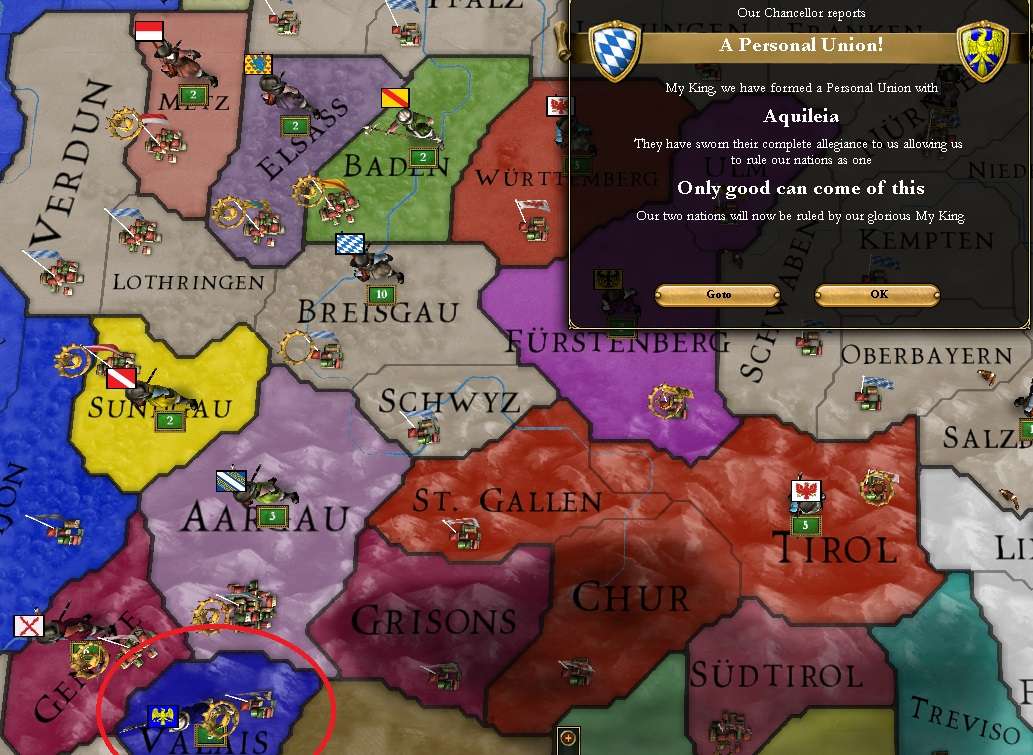
However, Ulrike was increasingly ill, and when she died in early 1539, chaos ensued. The contenders for the title of regent were Archbishop Albrecht, Markus Asch, and Chancellor Satzenhofen. Each had their own ideas of what the realm ought to be doing in the interim, but that wasn't even the worst part. An increasingly vocal minority of the Grafen and Baronen were trying to use the void in leadership to gain more local autonomy. They envisioned a true return to the feudal system, where the size of the Bavarian army depended solely on the goodwill of his nobles. This became particularly problematic when Marshal Asch unilaterally moved to drastically increase both training time and the length of service for the army, an army which was already broken into four parts of no fewer than 10,000 men each. Even more destabilizing was Albrecht's decision to burn a popular preacher for heresy when he dared to proclaim that Wilhelm had committed a mortal sin when ordering the death of Mark Sokoly.
The only way to settle power, at least on a temporary basis, was to rotate the regency between the three most important officials in the realm. The Marshal continued to conscript men into the army, the Chancellor continued to increase the centralized authority of the König, and the Archbishop became increasingly hardened against any form of dissent. Completely banning all non-Catholic religious meetings certainly increased the zeal of the populace, but at the expense of driving out those souls who had chosen a Protestant faith.

It had been Markus Asch who hired Livizzani, yet was disturbed to see Livizzani push this hardliner attitude even farther.

The lack of stability was a clear threat to the realm, and without a strong, vibrant leader, Clemens I might not have had a kingdom by the time he achieved his majority.
19 September 1544, Nürnberg
Clemens I von Hohenzollern, Kaiser of the Holy Roman Empire and König von Bayern, became increasingly involved in decisions as he grew older. While not reprimanding either Archbishop Albrecht or Bishop Joseph for their, perhaps, excessive zeal, Clemens still managed to convince people in his very first speech -- delivered at the age of 13 -- of the crown's beneficence in this matter, and in particular his simple desire for increased stability. Almost overnight, the first county renounced Protestantism -- Schwaben.
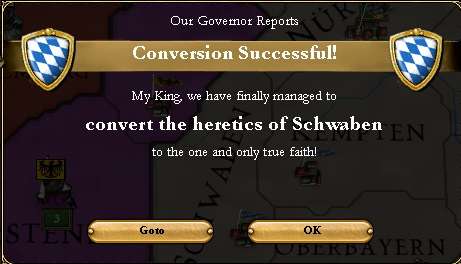
By early 1543, every single heretical county had a committed and devoted missionary seeing to their spiritual needs.

When Leiningen converted at the end of 1543, a group of nobles -- previously those arguing most loudly for autonomy -- presented a gift of over 200 ducats to the royal treasury. The money went into establishing new workshops, and the Boy King proved his exceptionalism again and again. The Pope showed his gratitude by appointing two Cardinals to the Holy See from Bayern.
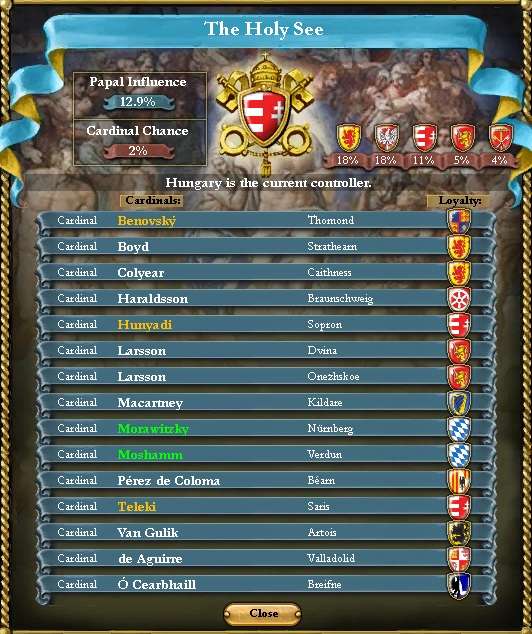
Archbishop Albrecht had retired in December of 1543, and passed away quietly in his sleep a few days later. Simeon Morawitzky, the new Cardinal, had been his replacement for a matter of weeks before getting the promotion. Joseph Livizzani became Archbishop of Nürnberg after that, and had served ever since. It was Archbishop Joseph who crowned the new König and his heir.
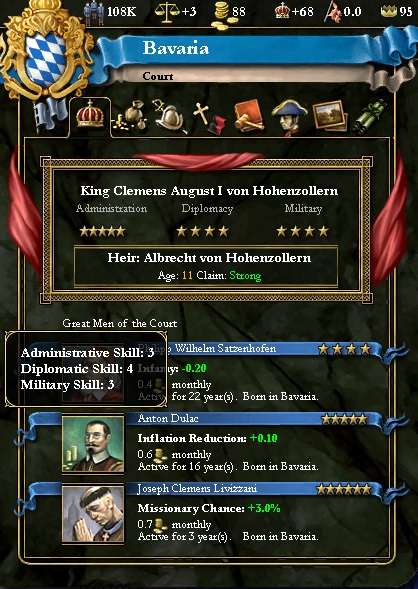
Albrecht von Hohenzollern was a distant cousin, born in Ingermanland. While the land was formally no longer part of Bayern, or even the Holy Roman Empire, the people remained solidly pro-Hohenzollern, and a branch of the family flourished there, an odd enclave of German Catholics in a sea of Swedish and Danish Protestants. Initially, Clemens had been delighted to see the succession secured; when he actually met young Albrecht, however, he realized that the northern Hohenzollerns had sent him solely as an insult. Albrecht looked as handsome as a statue -- and was roughly as intelligent. Clemens wisely realized that the appointment of such a figure as Prinz von Böhmen would cause riots, if not outright rebellion, and so he sensibly named himself as regent for the 11 year old Albrecht.
While Clemens sought glory and riches, as all his forebears had, his primary concern was securing the Hohenzollern line, and when he and his beloved Dorothea were married, he set out to do just that.
14 May 1547, Provence
Abdul Bahar had, as he grew older, grown fonder and fonder of muskets as a method of killing as he lost the ability to swing an axe. One of the other duties of the regency council had been to transfer the realm's most enthusiastic killer to somewhere he could do more good -- the army. Bahar would never be a General, as his approach lacked subtlety, but he made an excellent Oberst, inspiring and fearsome to his men. His regiment had captured a dozen flags in the recent war with Ferrara, and he was named Graf von Monferrato in gratitude. The war against Ferrara began as an ultimatum: return the county of Monferrato to the Hohenzollerns or suffer the consequences.

Ferrara, thinking their allies would protect them, refused. It was one of the last mistakes it would ever make. Their tiny armies were quickly overrun -- the sight of an insane screaming Arab leading an army against you can be quite unnerving -- and several of their provinces annexed to the Empire. The resulting religious zeal helped secure conversions from Franken, Oberbayern, and Salzburg, the very first Protestant county.
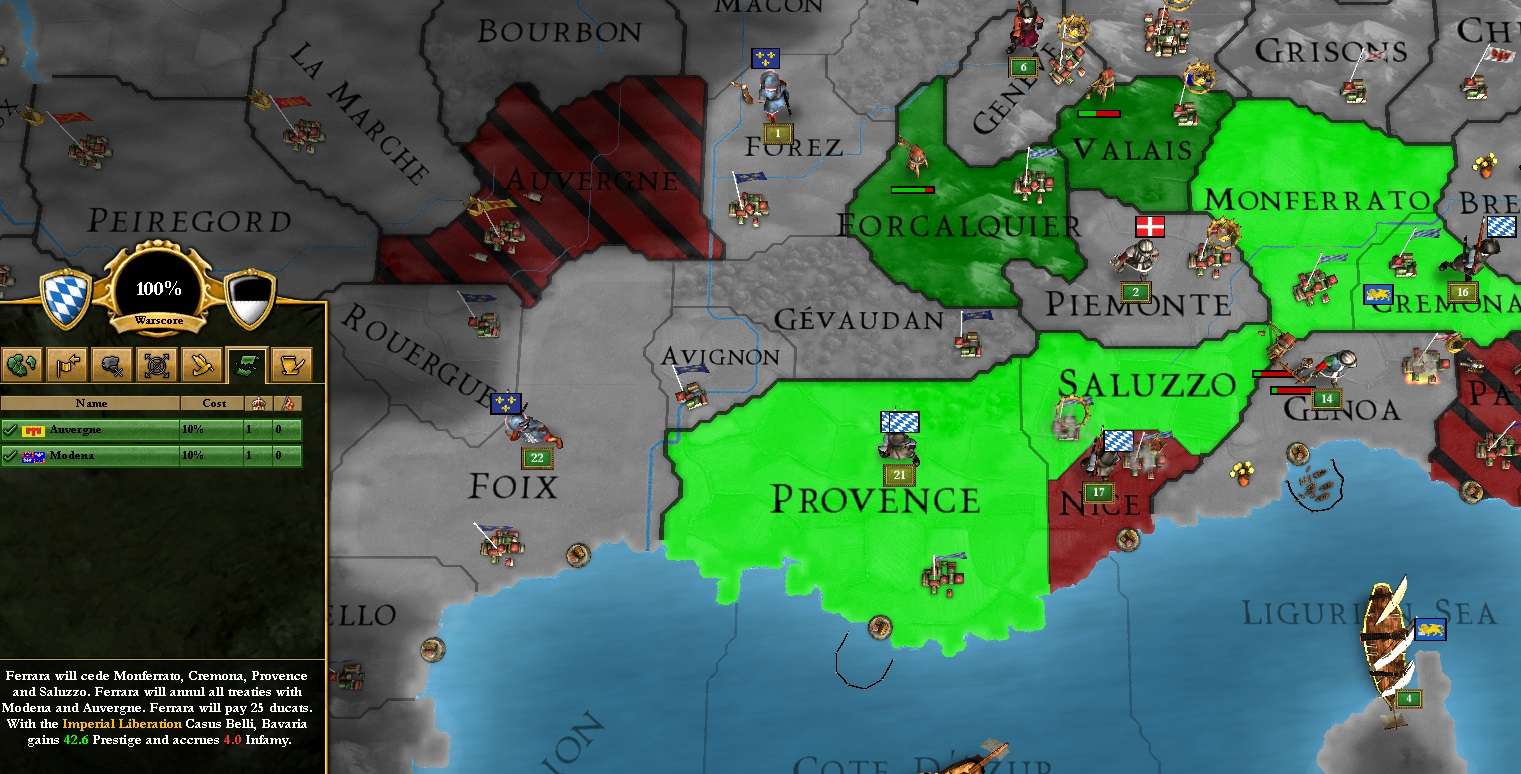
The integration of Monferrato (as formerly Hohenzollern) was simple. Cremona and Saluzzo also eagerly welcomed entry into Bayern. Provence proved to be more troublesome, however, as the largely French speaking population contained more than a few officers who had fought against Bayern in the recent past. After deliberations with the Reichsrat, Clemens agreed to allow the current ruler of Provence to be named Herzog in Clemens's name.
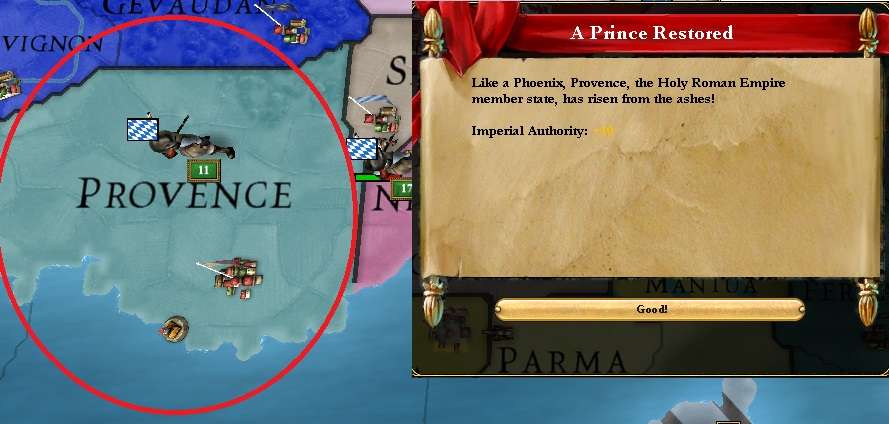
16 January 1549, Paris
The King of France sat, lips pursed, as he considered the situation. Bayern had pushing unacceptablly close to French borders, and whispers of Bavarian designs on one of his provinces rankled him. He looked questioningly at the man to his side.
"You are certain that now is the time, mon ami?"
"Oui, Your Highness. They shall never be able to respond."
The King nodded once. "Then you shall be Duke of Bavaria when have won."
"It is my family's birthright." As the King left to order his armies into Toulouse, the man stepped into the light. Gottfried von Habsburg had finally found an ally willing to help him achieve his goals. Bavaria was doomed.
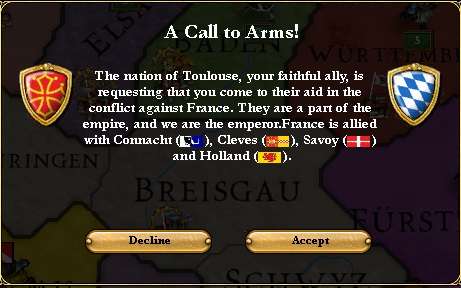
I will update again in the middle of next week. No contest this time around (sorry), but there will be after the next update. Enjoy!
Good update. Even if my guy died.
Thanks, he was getting pretty old.
Oh, those Habsburgs. You can never count them out, especially when the Hohenzollerns are concerned.
The French are a constant thorn in your side. You should mercilessly occupy their entire country and watch in glee as they fall apart to rebels. Let all the French minors free!
The French are a constant thorn in your side. You should mercilessly occupy their entire country and watch in glee as they fall apart to rebels. Let all the French minors free!
Oh, those Habsburgs. You can never count them out, especially when the Hohenzollerns are concerned.
The French are a constant thorn in your side. You should mercilessly occupy their entire country and watch in glee as they fall apart to rebels. Let all the French minors free!
That would certainly be a lovely idea, in theory.
I hope the new King manages to reproduce because that's one moronic heir you've ended up with.
I hope the new King manages to reproduce because that's one moronic heir you've ended up with.
Tell me about it.
Maybe it would be a good idea to place such a wonderful heir at the command of an army of, say, 1000 soldiers and launch it against the biggest french army, only to increase his military skill. :huh:
Now in serious, when you win France I hope that you liberate provinces of Castille/Spain from them. That way you will create a big problem on France back to liberate pressure from your frontiers besides becoming friend of the most important country in the world


Now in serious, when you win France I hope that you liberate provinces of Castille/Spain from them. That way you will create a big problem on France back to liberate pressure from your frontiers besides becoming friend of the most important country in the world
Maybe it would be a good idea to place such a wonderful heir at the command of an army of, say, 1000 soldiers and launch it against the biggest french army, only to increase his military skill. :huh:
Now in serious, when you win France I hope that you liberate provinces of Castille/Spain from them. That way you will create a big problem on France back to liberate pressure from your frontiers besides becoming friend of the most important country in the world
A very fine strategic suggestion!
Looks like this update will come Friday-ish; maybe Thursday, but no earlier.

